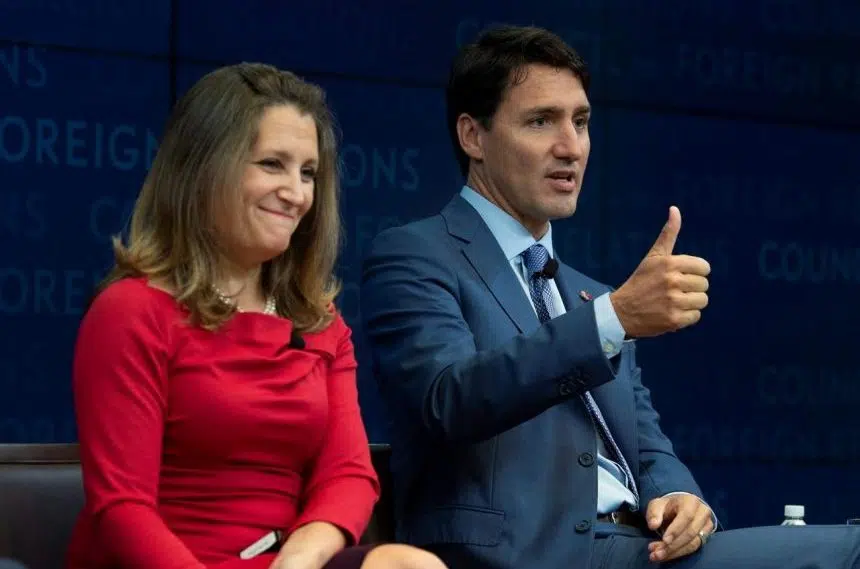UNITED NATIONS, N.Y. — U.S. President Donald Trump says he rejected a request for a one-on-one NAFTA meeting with Prime Minister Justin Trudeau this week because Canada’s tariffs are too high and the country’s trade negotiators have refused to budge.
Trump made the comments late Wednesday as part of a free-wheeling news conference at the end of the United Nations General Assembly.
“Yeah, I did,” Trump said when asked whether he rejected a meeting with Trudeau on the renegotiation of the North American Free Trade Agreement.
“His tariffs are too high and he doesn’t seem to want to move. And I’ve told him, forget about it.”
In his response, Trump also complained about Canada’s negotiators and appeared to make a specific reference to Foreign Affairs Minister Chrystia Freeland — who has been Trudeau’s NAFTA point person since talks began 13 months ago.
“We’re very unhappy with the negotiations and the negotiating style of Canada — we don’t like their representative very much,” Trump said.
Shortly after Trump’s news conference, the Prime Minister’s Office disputed the president’s statement — insisting it did not request a meeting. Trudeau’s office declined further comment.
At one point in his response, Trump praised Canada: “I love Canada, by the way, I have so many friends … but that has nothing to do with this.”
He did, however, reiterate his threat to slap Canadian auto imports to the U.S. with tariffs, which experts say would devastate industries in both countries.
“And, frankly, we’re thinking about just taxing cars coming in from Canada,” he said. “That’s the motherlode, that’s the big one.”
Hours earlier, in New York, Trudeau gave Canada’s NAFTA-talks nemesis a gentle nudge during his own closing news conference that followed the General Assembly.
Trudeau told reporters that Trump had insisted repeatedly that punitive American tariffs on steel and aluminum won’t be an issue under a new North American trade deal.
The prime minister made the comment after being asked about U.S. trade ambassador Robert Lighthizer’s recent glum assessment of the talks, which remain deadlocked over issues like dispute resolution, access to Canada’s dairy market and the so-called Section 232 tariffs on Canadian steel and aluminum.
Trump has said “a few times” that a new deal would mitigate the tariff issue, Trudeau said.
“One of the things in my many conversations with President Trump on the issue of 232 tariffs … was his insistence that while if we renegotiate NAFTA, if we get to a NAFTA deal, there will be no need to worry about these other things,” Trudeau said at the UN.
“We are continuing to work on getting to a right deal for Canada, a right deal for Canadians, and that involves, obviously, feeling confident about the path forward as we move forward — if we do — on a NAFTA 2.0 and the … lack of punitive tariffs that we consider are unjust.”
On Tuesday, Lighthizer — also in New York for the UN General Assembly — said while the two sides remain far apart on a number of issues, the two sides have agreed for now to deal with the issue of 232 tariffs separately.
“I think the U.S. would like (Canada) to be in the agreement, but there’s a still a fair amount of distance between us,” he said.
“On steel and aluminum on this point, we started off trying to have some kind of overall agreement that would accomplish that. I think our view is now we’ll turn to that as a next stage.”
Trudeau’s interactions with the mercurial U.S. president have been a subject of great curiosity over the course of his three days at the General Assembly.
First, there were the comments from U.S. national security adviser John Bolton, who suggested Monday that requests for a bilateral meeting “couldn’t be accommodated.” Officials in the PMO insisted no such request had been made, given already close contact with the White House.
The next day, what appeared to be a brusque encounter between the two leaders — Trump appeared to ignore the prime minister at a UN luncheon until Trudeau tapped him on the shoulder, only to shake hands with a still-seated president — sent tongues wagging.
“I don’t think there’s anything to read into it,” Trudeau said. “It was an interaction like so many are (at the) UN — quick but cordial. There are all sorts of opportunities for me to speak to President Trump, and that was not the time.”
Even so, the two leaders have spent little time together in the spotlight since Trump’s infamous outburst following this summer’s G7 meetings in Charlevoix, Que., where Trudeau’s seemingly benign defence of Canadian interests at a post-summit news conference sent the president into a bitter Twitter tirade from the confines of an airborne Air Force One.
The NAFTA impasse can’t be helping matters, either.
Earlier Wednesday, Canada’s U.S. envoy David MacNaughton, who has taken part in the Washington talks alongside Foreign Affairs Minister Chrystia Freeland, pegged the likelihood of a new trade deal by Sunday’s congressional deadline at a “five” on a scale of one to 10.
While the talks have been “challenging,” the ball is on the U.S. side of the court, MacNaughton said at an event in Toronto hosted by the U.S. website Politico.
“I think everybody knows what each other’s position is on all of the major issues and I think it’s really a question of whether or not the U.S. wants to have a deal.”
Canada is “anxious” to strike an agreement to bring some certainty to the investment climate and to open the door for Ottawa to start working more closely with the Americans on some of the bigger issues that confront both countries, he added.
“We’ll see where it goes, but so far it’s been tough,” he said. “It’s been long and exhausting, but I think we’ve narrowed the gap.”
James McCarten, The Canadian Press







